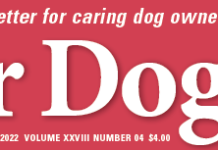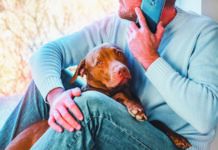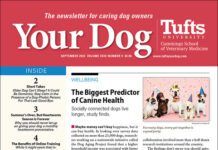Wildfires and Your Dog’s Breathing
The smoke from wildfires coming south from Canada this year affected people’s breathing across much of the northern tier of the country. Dogs have it worse than people because they can’t wear masks to keep out toxic particulates. At least one major veterinary hospital saw an uptick in cases of breathing difficulties among dogs affected by the smoky air. Exposure can cause irritation to the throat, nose, and eyes and even coughing and gagging.
Low Thyroid Hormone Levels Don’t Always Signify Thyroid Disease
Signs of canine hypothyroidism — too little of certain thyroid hormones — often come on subtly and slowly, progressing over years, and therefore can be easy to miss or misattribute to advancing age. These signs often include poor coat quality, lethargy, mental dullness, exercise intolerance, and weight gain. If this constellation of symptoms describes your dog, it’s worth discussing whether an evaluation for hypothyroidism is in order, as treatment is available.
When Your Dog Says “No Canoodling!” with Your Human Partner
Perhaps your dog barks when you and your partner hug or kiss or show other signs of amorousness. Maybe she even tries to stop acts of physical intimacy, getting between you and your mate. Is she jealous?
Does Your Dog Have Irritable Bowel Syndrome or Inflammatory Bowel Disease?
Your dog has intermittent bouts of diarrhea and vomiting and alternates between straining to defecate and having a sudden urge to defecate. Additionally, she is experiencing abdominal discomfort (rumbly tummy and flatulence) and a concomitant loss of appetite. Does she have irritable bowel syndrome (IBS) or irritable bowel disease (IBD)?
Teaching Your Dog That When He Needs to Go Out, the Bell Tolls For...
Some dogs have access to a doggie door that allows them to exit and re-enter at will, so they can “go to the bathroom” whenever they want. Fortunately for those who are unable to go out when they want, dogs are generally excellent at “holding it in” and can wait for the appointed times at which you take them to do their business. But still, there are those moments when they really need to relieve themselves even though it’s not time for their scheduled walk. What then?
Your Role in Reporting Your Dog’s Bad Reaction to a Product
Your dog has a bad reaction after eating a certain food, getting a particular vaccine, having a topical applied to ward off ticks or other parasites, or undergoing home treatment with a device that is supped to relieve pain or heal a wound. Does the adverse reaction have to be reported? No. There is no legal requirement. Should it be? Yes.
Some Dog Breeds Appear More Sensitive to Pain Than Others
There has been a belief among veterinarians that some dog breeds are more sensitive to pain than others. And new research suggests they are right. But the breeds commonly thought to be particularly pain-sensitive may not be the ones that truly are. That’s because vets appear to be making their determinations based on dogs’ reluctance to come over to them and interact in novel situations rather than on the animals’ actual sensitivity to pain.
Dog won’t stop eating poop
Q: Our 3-year-old Havanese is a great leash puller and sniffer, a mostly wonderful dog except for her absolute certainty that the poop of other animals makes a terrific snack. Since her legs are close to the ground, she’s fast and very good at lunging suddenly when she wants to grab some “delicacy.” We — not the youngest kids on the block — are outwitted at every turn. Bunny poop, goose poop, dog poop — she is not particular. A trainer we consulted thought we might try using a device that issues a high-pitched sound to make negative associations for her at those moments. But I’m not sure I have enough hands to carry the device on a walk, much less mobilize it in a timely fashion. And I’m not sure it’s a good approach. I’d appreciate any advice you can offer.
Download The Full September 2023 Issue PDF
- The Biggest Predictor of Canine Health
- Short Takes
- Summer’s Over, But Heartworm Season Is Forever
- The Benefits of Online Training
- It’s Okay to Comfort Your Dog
- Protect the Mail Carrier!
- The One Word Your Dog Will Never Understand
- Dear Doctor
The Biggest Predictor of Canine Health
Maybe money can’t buy happiness, but it can buy health. In looking over survey data collected on more than 21,000 dogs, researchers working on a nationwide initiative called the Dog Aging Project found that a higher household income was associated with better health for the dog in the home. No surprise there. More money means pets receive better medical care. What was surprising was that the company of other dogs and even companion animals of other species, such as cats, had a positive health effect that was five times greater than the effect of family income. A vibrant canine social life even had a bigger impact than house-
hold stability.
Older Dog Can’t Sleep? It Could Be Dementia
If your older dog has begun pacing the floors at night and having trouble settling down, it could be a sign of dementia, just as people with age-related dementia may feel restless at night with a sign of Alzheimer’s disease known as sundowner’s syndrome. When researchers at North Carolina State University studied 28 dogs ages 10 to 16, they found that those with dementia took longer to fall asleep and spent less time sleeping. The higher the dementia score, the less time the dogs spent in both REM and non-REM sleep.
Stay Calm in the Presence of a Dog-Phobic Person
It’s an unfortunate catch-22: People who are nervous around dogs are the ones who tend to bring out their aggressive tendencies. Their anxiety transfers to the animal. Research has shown, in fact, that anxious people have a higher incidence of getting bitten by a dog.
















